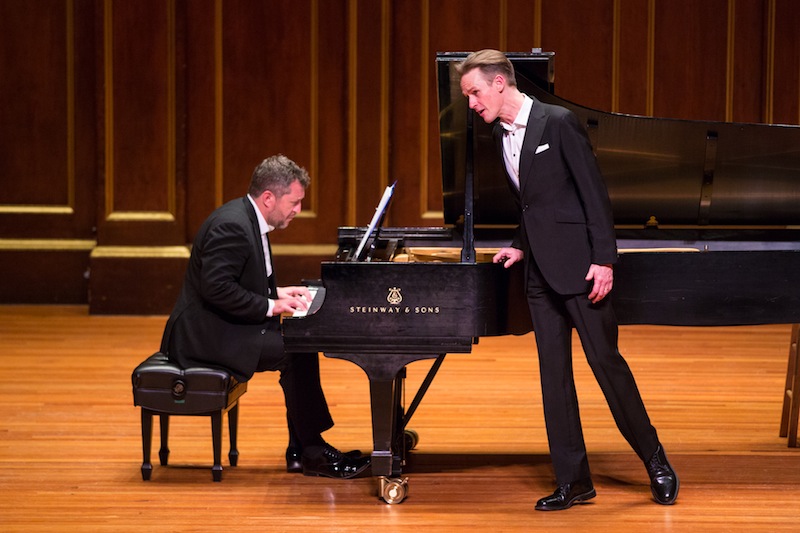Bostridge and Adès bring a deep, cold brilliance to Schubert’s “Winterreise”

Ian Bostridge and Thomas Adès performed Schubert’s “Winterreise” Friday night at Jordan Hall. Photo: Robert Torres
1827 was a climactic year for Franz Schubert. Depressed and suffering from syphilis, the composer yet managed to create some of the deepest and most introspective works of his short life, including his agonizing song-cycle Winterreise. The twenty-four songs, set to poems by Wilhelm Müller, tell a tale of a wanderer’s inner struggle, rage against fate, and spiral into despair.
Few singers know this work more intimately than tenor Ian Bostridge, who presented the cycle in a recital co-sponsored by the Celebrity Series and the Boston Symphony Orchestra Friday night at Jordan Hall. Thomas Adès, who begins his role as artistic partner with the BSO this season, proved a simpatico partner at the piano.
Bostridge has been singing Winterreise for over thirty years and his interpretation of the work has only deepened over time. His voice is capable of various shades of color, warm and radiant in some phrases and cool and distant in others. Moreover, his singing evocatively portrayed the music’s wide shifts of mood, and captured the theatrical aspects of this personal, pained work. It is as if the wanderer was having a conversation with himself, caught up in his own inner pain.
From the first song, “Gute Nacht,” Bostridge found himself in deeply emotional territory. With a hollow tone that bordered on bleakness, he sang of the wanderer’s lost love. The sorrowful music briefly turns to a bright D major as Bostridge’s wanderer pledges not to disturb the beloved’s dreams. But it is short lived, and the music once again plunges into darkness.
That darkness permeates much of the work. In “Die Wetterfahne” Bostridge sang with a quiet anger. “Gefrorne Tränen” was cold and brooding, the music conjuring tears falling on a hard surface. “Erstarrung” has a brief moment of sunshine, though grief roils just beneath the surface, and the inner verses of “Wasserflut” glistened with a soft radiance, with Bostridge swelling his phrases is if weeping.
In “Rast,” the wanderer longs for rest and the singer’s subtle dissonances signaled the pangs of anguish. Dreams are the wanderer’s only escape. In “Frühlingstraum” the music shifts abruptly from feathery sequences to passages of utter turmoil. Being awake, for the character, is too painful and the traveler’s thoughts turn towards death. Bostridge’s coldly distant singing in “Das Wirtshaus” conjured the gloom of the graveyard. Adès, at the keyboard, gave the hymn-like chords a quiet reverence.
Throughout, Adès played with a fine feel for the drama inherent in Schubert’s song cycle. His phrasing was sensitive and spacious, as in the sparse chords of “Irrlicht,” which flowered into sprinkling textures before dying down again. “Frühlingstraum” ran the gamut from a soft detached melody to passages of violence and, in other places, almost saccharine textures. His playing in “Einsamkeit,” a portrait of the Wanderer’s loneliness, was especially searching.
The inner phrases of “Mut” beamed from a sudden moment of optimism. The piano’s open fifths vividly captured the hurdy-gurdy played by an old man in the final song, “Der Leiermann.” Moved by what he sees, the wanderer presses on into a seemingly never-ending journey. It’s a bare and strangely unsettling ending to the cycle, and Bostridge and Adès gave it a performance of cold brilliance.
The next Celebrity Series program will feature cellist Sol Gabetta and pianist Bertrand Chamayou in music of Beethoven, Chopin, and Britten 8 p.m. Wednesday at Pickman Hall. celebrityseries.org; 617- 482-6661.
Posted in Performances



